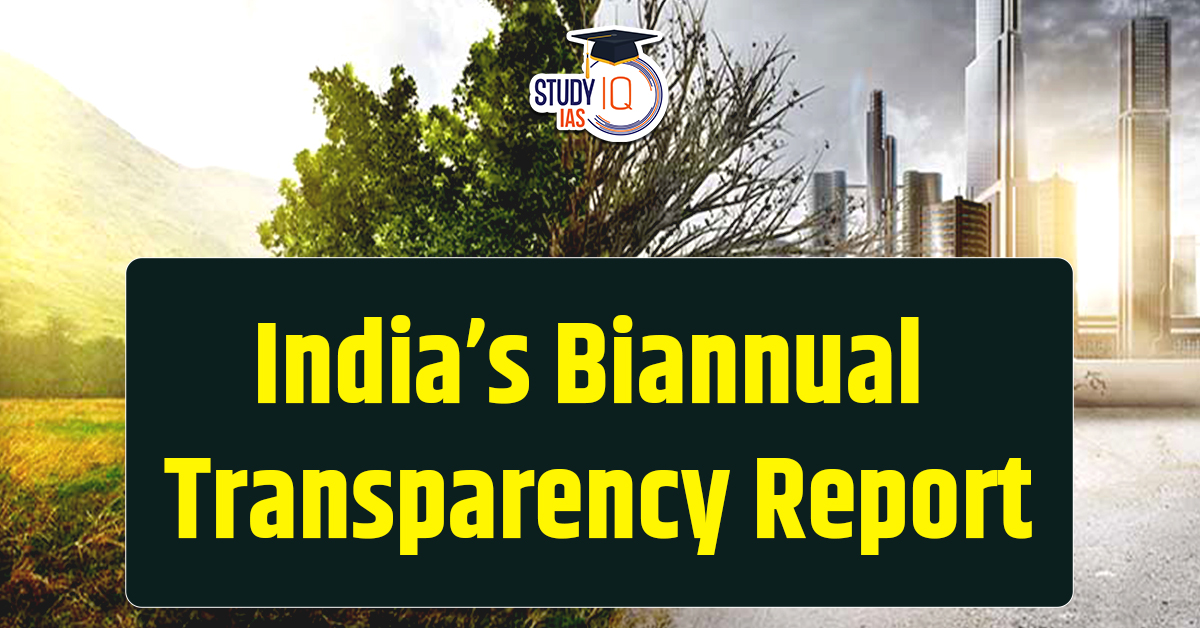Table of Contents
Context: India is in the final stages of preparing its first-ever Biannual Transparency Report (BTR). This is part of India’s commitment under the 2015 Paris Agreement on climate change.
About Biannual Transparency Report
- BTR is an official document that provides details on:
- India’s greenhouse gas emissions inventory (sectors and sources of emissions).
- Efforts to improve energy efficiency and shift to renewable energy sources.
- Availability of resources for climate action.
- Unlike previous submissions like National Communications and Biannual Update Reports (BURs), the BTR will be subject to technical review by UNFCCC-accredited international experts.
- This will ensure greater accountability and transparency
- Comparison with Previous Reports: The last BUR (submitted earlier) contained data up to 2020. The upcoming BTR will present more recent and updated figures on India’s emissions and climate action efforts.
Global Context and Compliance
- Historically, only developed countries were required to submit BTRs.
- However, under the Paris Agreement, all signatories agreed to submit BTRs to increase transparency.
- Deadline: All countries were expected to submit BTRs by December 2024, but several—including India—missed this deadline.
Key Highlights of Biannual Transparency Report
Here are the key highlights of the Biannual Transparency Report:
1. Greenhouse Gas (GHG) Inventory
- Provides a sector-wise breakdown of GHG emissions up to the year 2022.
- Covers key sectors: Energy, Industry, Agriculture, Waste, and Land Use, Land-Use Change, and Forestry (LULUCF).
- Aims to improve data accuracy and reporting of emissions.
2. Mitigation Measures
- Details India’s climate mitigation actions, including:
- Expansion of renewable energy projects (solar, wind, hydro).
- Energy efficiency programs such as PAT (Perform, Achieve, and Trade) and UJALA LED program.
- Adoption of cleaner and more sustainable industrial practices.
3. Independent Technical Review
- Unlike previous reports, the BTR undergoes an independent review by UNFCCC-accredited experts for greater credibility and accuracy.
- Ensures that the reported data meets international standards.
4. Compliance with the Paris Agreement
- The report aligns with India’s commitment to the Enhanced Transparency Framework (ETF) under the Paris Agreement.
- Helps track progress toward Nationally Determined Contributions (NDCs) and climate goals.
5. Adaptation Strategies & Climate Finance
- Highlights adaptation efforts in agriculture, water resources, and disaster management.
- Showcases India’s investments in climate resilience and international climate finance commitments.
6. Role in Global Climate Action
- Reinforces India’s position as a responsible global climate leader.
- Demonstrates India’s focus on low-carbon growth and sustainable development.


 Bioluminescent Beaches - Kavaru
Bioluminescent Beaches - Kavaru
 Malabar Grey Hornbill, Characteristics a...
Malabar Grey Hornbill, Characteristics a...
 Salt Pan Land Cleared for Dharavi Redeve...
Salt Pan Land Cleared for Dharavi Redeve...





















